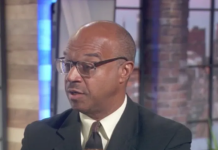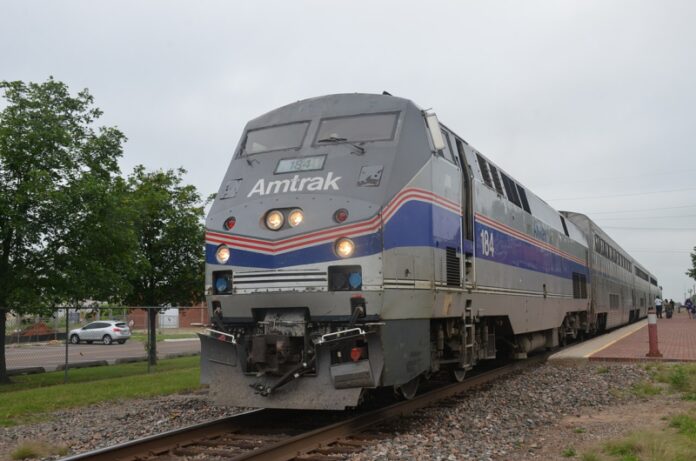A proposal that would allocate $50 million to passenger rail service in Kansas over 10 years is running into difficulty in the Legislature.
The legislation is intended to help fund the Heartland Flyer, a proposed passenger rail service between Newton, Kansas and Oklahoma City.
The service would complete a missing rail link from Kansas to Fort Worth with connections to Dallas and San Antonio on Amtrak’s Texas Eagle.
The route would also connect to Amtrak’s Southwest Chief, which runs from Los Angeles to Chicago with stops in Newton, Hutchinson, Dodge City, Garden City, Topeka, Lawrence and Kansas City.
The goal is to use interest from the money that is set aside to go toward passenger rail service, mostly likely the Heartland Flyer.
However, Republican state Rep. Shannon Francis, chair of the House Transportation Committee, said the legislation is premature and he doesn’t intend to work the bill, which already passed the Senate on a 34-6 vote.
He wants a feasibility study completed to show more details about cost before he would be ready to commit money to the project.
“We don’t have a feasibility plan yet,” Francis said in an interview.
“We don’t know what it’s going to cost. So why are we programming money on a project that we don’t even know is feasible?”
The bill would require $5 million of unencumbered funds in the state general fund, the state highway fund and special transportation revenue funds to be transferred to a fund for passenger rail service each year from fiscal year 2025 through 2035.
Under the state’s current transportation budget, fiscal analysts said there are no unencumbered funds now available to be transferred from the state highway fund.
Further, all state highway fund revenues going to the state’s current multiyear transportation programs are already committed to current and future projects.
The bill passed the Senate on a 34-6 vote, but it stalled in the House.
The bill was referred to the House Judiciary Committee, which used it as a shell for the contents of another bill that continued several exceptions to the open records law.
The rail service funding was removed and replaced with the open records content.
The bill sparked a somewhat unusual debate about transportation funding in a committee generally charged with sorting out legal issues confronting the state.
Republican state Rep. Susan Humphries is chair of the Judiciary Committee.
She said the bill was sent to her committee after the House transportation committee chair said he didn’t intend to work the legislation.
Democrats on the committee objected to replacing the bill funding passenger rail with another bill related to continuing part of the open records law.
State Rep. John Carmichael, a Wichita Democrat, asked about the fate of the money that was allocated by the legislation.
He protested using the passenger rail bill as a means to pass continuing exceptions to the open records law.
“This bill is advocated by the city of Wichita, it’s advocated by Sedgwick County. It’s advocated, as I recall, by the Chamber of Commerce,” Carmichael said.
“It’s advocated by anybody and everybody in south, central Kansas,” he said.
“If you think you need to mess around and do a gut-and-go on something, you sure don’t do a gut and go on something like the Heartland Flyer,” he said.
“This is important to our constituents in Wichita. It’s important to constituents all the way from Oklahoma City to Chicago,” he said.
Republican state Sen. Stephen Owens of Hesston said the bill is not dead, noting it already passed the Senate and could be part of negotiations in a conference committee.
“This is by no means the stake of death” for the bill, he said.
The bill in question is broader in scope than what was proposed in the budget.
The Senate approved a budget that included $5 million in one-year funding for passenger rail from the state highway fund.
A House budget subcommittee recommended $5 million for passenger rail, but it was removed at Francis’ request when it was considered by the Appropriations Committee.
“There are a number of things that need to be investigated on this so we know what the cost is,” Francis said during the Appropriation Committee hearing.
In an interview, Francis said he had concerns about taking money from the state highway fund for a future project for which there are still unknowns.
“We’re taking funds that are needed now that there’s demand for a project that we haven’t even determined if it’s feasible,” he said.
Humphries said she didn’t believe that failure to pass the bill would bring an end to the Heartland Flyer project, noting the momentum the project has among community leaders.
“There’s no way the Heartland Flyer is disappearing at this point,” she said.
“There are plans to continue on,” she said.
“I don’t think we’ve killed the Heartland Flyer,” she said.
“I think there’s a lot of people in favor of it. I think it will live on as many things do in this building,” she said.
Carmichael said the Legislature’s actions could hurt the state as it competes for more federal funding for the Heartland Flyer project.
“Gutting and going on this bill sends a terrible message to Amtrak about this state’s commitment to the expansion of the Heartland Flyer,” he said.
Last year, Kansas received a federal grant of up to $500,000 for planning the Heartland Flyer extension that was ended more than 40 years ago.
The new federal money would go toward developing a scope, schedule and cost estimate for preparing, completing or documenting the service development plan for the project.
The awarding of the grant is significant because it opens the door for Kansas to qualify for other federal money that would pay for the project in different stages, including environmental, engineering and design work as well as the early years of operating costs.
Republican state Sen. Carolyn McGinn, who has led efforts to get the Heartland Flyer extended into Kansas, said she was disappointed by the setback in the House.
“It may not be the end of the world, but the problem is we have to show we are serious about adding that link to Oklahoma City, and if we don’t show support we may not get the Federal Railroad Administration money,” she said.
“I am disappointed that we have a couple of people who are fighting this when it’s going to benefit their constituents the most,” she said.
“As far as I’m concerned, the conversation is not over.”
















